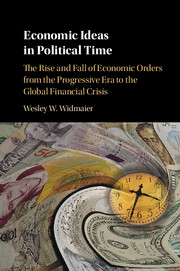 Economic Ideas in Political Time
Economic Ideas in Political Time Book contents
- Economic Ideas in Political Time
- Reviews
- Economic Ideas in Political Time
- Copyright page
- Contents
- Preface
- Book part
- Part I Theoretical and Historical Foundations
- Part II The Construction, Conversion, and Collapse of the Keynesian Order
- Part III The Construction, Conversion, and Crisis of the Neoliberal Order
- 6 Constructing the Neoliberal Order: Breaking Labor and Boosting Finance
- 7 Converting the Neoliberal Order: Toward the New Keynesianism
- 8 Constructing the Global Financial Crisis: From Accommodation to Iteration
- Part IV Conclusions
- Bibliography
- Index
8 - Constructing the Global Financial Crisis: From Accommodation to Iteration
from Part III - The Construction, Conversion, and Crisis of the Neoliberal Order
Published online by Cambridge University Press: 05 July 2016
- Economic Ideas in Political Time
- Reviews
- Economic Ideas in Political Time
- Copyright page
- Contents
- Preface
- Book part
- Part I Theoretical and Historical Foundations
- Part II The Construction, Conversion, and Collapse of the Keynesian Order
- Part III The Construction, Conversion, and Crisis of the Neoliberal Order
- 6 Constructing the Neoliberal Order: Breaking Labor and Boosting Finance
- 7 Converting the Neoliberal Order: Toward the New Keynesianism
- 8 Constructing the Global Financial Crisis: From Accommodation to Iteration
- Part IV Conclusions
- Bibliography
- Index
Summary
- Type
- Chapter
- Information
- Economic Ideas in Political TimeThe Rise and Fall of Economic Orders from the Progressive Era to the Global Financial Crisis, pp. 179 - 202Publisher: Cambridge University PressPrint publication year: 2016


